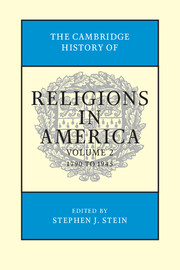Book contents
- Frontmatter
- Contents
- Contributors
- Editor's Introduction
- SECTION I RELIGION IN NORTH AMERICA
- SECTION II RELIGIONS IN THE NEW NATION, 1790–1865
- SECTION III CHANGING RELIGIOUS REALITIES
- SECTION IV RELIGIOUS RESPONSES TO MODERN LIFE AND THOUGHT
- 21 Religion and Immigration, 1865–1945
- 22 Religion and the Modern City, 1865–1945
- 23 Religious Responses to Industrialization, 1865–1945
- 24 Religious Responses to Modern Science, 1865–1945
- 25 Religious Responses to Philosophy in America, 1865–1945
- 26 Fundamentalism
- 27 Religiously Informed Social Reform and Reaction in the Era of the Great Depression
- 28 Nativism from the New Republic to the Cold War
- 29 Between God and Caesar: World War I and America's Religious Communities
- 30 World War II and America's Religious Communities
- SECTION V COMPARATIVE ESSAYS
- SECTION VI RELIGION AND DIVERSE AREAS
- Index
- References
25 - Religious Responses to Philosophy in America, 1865–1945
from SECTION IV - RELIGIOUS RESPONSES TO MODERN LIFE AND THOUGHT
Published online by Cambridge University Press: 28 July 2012
- Frontmatter
- Contents
- Contributors
- Editor's Introduction
- SECTION I RELIGION IN NORTH AMERICA
- SECTION II RELIGIONS IN THE NEW NATION, 1790–1865
- SECTION III CHANGING RELIGIOUS REALITIES
- SECTION IV RELIGIOUS RESPONSES TO MODERN LIFE AND THOUGHT
- 21 Religion and Immigration, 1865–1945
- 22 Religion and the Modern City, 1865–1945
- 23 Religious Responses to Industrialization, 1865–1945
- 24 Religious Responses to Modern Science, 1865–1945
- 25 Religious Responses to Philosophy in America, 1865–1945
- 26 Fundamentalism
- 27 Religiously Informed Social Reform and Reaction in the Era of the Great Depression
- 28 Nativism from the New Republic to the Cold War
- 29 Between God and Caesar: World War I and America's Religious Communities
- 30 World War II and America's Religious Communities
- SECTION V COMPARATIVE ESSAYS
- SECTION VI RELIGION AND DIVERSE AREAS
- Index
- References
Summary
Claims concerning the foundations of knowledge and the nature of reality have played a central role in American religious discourse. For that reason many participants in that discourse have engaged in a lively, often spirited interaction with philosophical thought. This was especially the case in the late nineteenth and early twentieth centuries, when profound changes in American cultural and intellectual life resulted in challenges to prevailing doctrines and traditional sources of religious authority. In responding to those changes, many theologians, clergy, and learned laypeople found themselves drawing on the resources of philosophy in formulating and defending their worldviews.
For much of the period between 1865 and 1945 the engagement of American religious thinkers with philosophical reflection and analysis was motivated primarily by a desire to come to grips with the implications of modern science. By the second half of the nineteenth century scientists had become quite successful in describing phenomena in terms of intelligible natural laws, and many enthusiastic supporters of their efforts saw no reason to doubt that the reign of order pervaded the entire universe. Just as importantly, even pious members of the scientific community were coming to believe that “it is the aim of science to narrow the domain of the supernatural, by bringing all phenomena within the scope of natural laws and secondary causes.”
- Type
- Chapter
- Information
- The Cambridge History of Religions in America , pp. 545 - 568Publisher: Cambridge University PressPrint publication year: 2000

